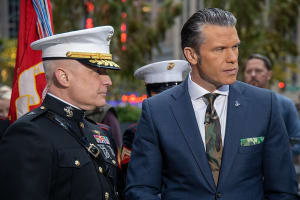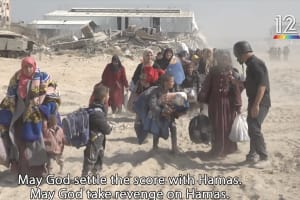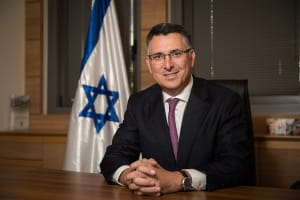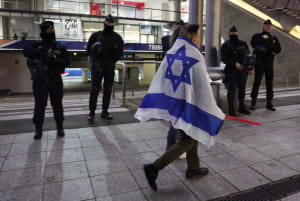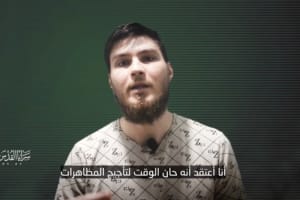Testimony: An Iranian Muslim finds Yeshua, moves to Israel

Ramin Parsa is a born-again believer and former-Muslim who runs a charity in Netanya called the Hope of Israel Ministries.
The ministry feeds about 1,500 Israelis a day, close to 40,000 meals total since the beginning of the war, including internally displaced Israelis in the southern Israeli communities of Ashkelon, Ashdod and Shoresh.
Residents were displaced from their homes following the Oct. 7th massacres by Hamas and the IDF's ongoing war in Gaza. With the help of 40 people, they prepare tasty, hot meals at a commercial kitchen that was loaned to their ministry for that purpose. The venture has broadened to include military bases, where it is a welcome treat for soldiers who are used to mostly bland fare.
Parsa was born in Iran in 1986 – seven years after the Ayatollah came to power and replaced the Shah – and was raised as a Muslim under Sharia Law. He said that “Life became hell for people" after the Muslim regime came to power in 1979."
"They executed tens of thousands of people, important people, people who had very important jobs. They were murdered and killed and executed. Millions fled. Almost 8 million people have fled Iran since the beginning of the revolution.”
He said that following the revolution, there was a war with Iraq.
“A million people died in the war. So this great economy – the Persian economy – collapsed and the regime caused war and destruction. Just in a matter of a year, the nation was destroyed. And so I was born in that situation. I was born in the middle of the war with Iraq. And I still remember I could hear sirens and the bombings."
Parsa recalls growing up and being taught that Jews were evil.
“In the school, everything was Islamic. In our textbooks, we had the caricatures of Israeli soldiers killing these Palestinian babies. And the babies crying... it was not real but they wanted to sow the seed of hatred in our hearts toward the Jews and Israel."
He said that by the age of 11 or 12, he would people being executed in the middle of the street, hanging from cranes. “And for weeks I was traumatized. I had nightmares. I couldn't eat. I was completely traumatized, seeing people in front of me dying, as a young boy. So I was told, these are infidels, these are criminals, these are evil people."
"Until it happened to me," Parsa began. "When I was 16 years old, I was arrested and tortured by the Islamic regime in Iran for no reason.”
While on his way to a wedding as a passenger in a car, he was caught with a small amount of alcohol present. It was not his, however: “Based on Islamic law, it's forbidden to have alcohol, to buy it, to sell it, to drink it, to possess it. And my only crime was I was in that car. And they took us to confinement. They took all our clothes off, bare naked."
Parsa described the torture. He was drenched with ice water and beaten with an electric cable, all while he was completely naked. He was placed on a chair facing a blank wall and ordered to continually stand and sit. “If you couldn't sit up and sit down, they would beat you,” said Parsa.
Then they were thrown into a room with no food or water, not even a toilet.
“It was a taste of hell,” said Parsa, as he described being thrown into a room without food or water, or even a toilet.

Eventually, Parsa was released from prison but his experience made him question the religion of Islam: "‘What kind of religion is this? What kind of justice is this?’”
His mother explained to him that Islam is good but the extremists are not, and from then on, Parsa was determined to learn the true message of Islam and whether the regime was acting according to its tenets.
He began studying the Quran in his native language, Farsi, and not Arabic. He also read the Hadith (reports of statements attributed to Muhammed) determined to see what the true message was.
“And I saw so many evil things in the Quran, in the Hadith, talking about killing the Jews, killing the infidels, beheading them," Parsa said. "And I could not accept or believe that this ideology came from the God who made the stars and the moon and the sun and all that is in the world. So I lost my faith in Islam gradually.”
Since Parsa lived in a fairly rural community he used to sleep out in the backyard at night and gaze at the stars. He said: “I was asking myself a question as a teenager, ‘Who made this whole world? If there's no God, then who made this world? If there's a God, who is he?’ But I knew it wasn't Allah, it wasn't the God of the Quran and the Hadith.”
At age 19, while flipping through the TV channels, Parsa said he happened upon a Christian station with a preacher talking about Yeshua/Jesus and that He was the son of God who died for our sins but rose from the dead.
Parsa said to himself: 'No, this is too good to be true' and rejected the idea because when he was growing up as a Muslim, he was told that Jesus didn't die, that He's not the son of God, that He did not rise from the dead. He's not the Savior.
“So when I heard this version, I said, ‘All of them (religions), are the same.’ I rejected that.”
One week later, Parsa found himself landing on the same Christian TV channel; and again, he heard the Gospel message, but rejected it because of his animosity toward religion, in general, he explained.
The third time he heard the Gospel, he could not ignore it.
“Jesus, if this is true, if you are truly the son of God, if you died for me on the cross – if you rose from the dead – I ask you to come into my life, show me. I want you to show me. I want you to prove it to me.” he said.
His statement was not from a place of pride or arrogance – he just wanted to know the truth, he explained.
“The moment I said that – heat went through my hand. It went through all of my body," said Parsa. I started shaking and I started crying. I felt a love I had never felt before. I felt a peace I had never felt before. I felt as if a 500-lb weight was lifted off of my shoulders. I began to feel love, even for the people who beat me and tortured me.”
“I began to forgive everybody, anybody who had ever hurt me," Parsa said. "And I felt this supernatural love. I knew I felt the presence of God in my room and I was completely transformed. I was full of love. I began to speak with tongues. Words are coming out of my mouth. I didn't know what I was saying, but it felt good. I went to visit my mom. We were living separately. I went to visit her. The moment my mother saw me, she said, ‘What happened to you?’ I said, ‘Why?’ She said, ‘Your face is shiny.’
Parsa was eventually able to pray for his mother, who was suffering from a chronic disease. He prayed for her to be healed in the name of Jesus and had confidence that those prayers would be heard.
"So I put my hands on my mother. I prayed in the name of Jesus, and my mother got healed from this chronic disease.”
Parsa wanted to share his newly discovered faith with other Muslims but also knew how dangerous it was, so he fled to Turkey, where he was deported to the United States.
During his flight to America, Parsa said the Holy Spirit had warned him against losing his fire, but at the time, he didn't understand what it meant.
His perception was that because America was a Christian country, everybody would be walking the streets reading a Bible and praying in tongues. However, after a few months, he understood what the Holy Spirit had warned him of.
“I saw people taking Christianity as just a part of their lives or it's just one of the religions, or some people don't even read the Bible. They didn’t even go to church, or they went when it was convenient. And I said: 'People are losing their lives in the Middle East for being a Christian. They don't clap for you. They kick you out of the house sometimes. They disown you. They even, in many cases, put you in prison, they kill you, they torture you.' And here I'm in America and the Lord spoke to me to keep my fire, to keep going. People thought I was crazy because I was talking to people about Jesus.”
Parsa said that he would visit hospitals and pray for the sick, floor by floor.
He came to love the Jewish people by reading the New Testament online in Iran, in particular, the first chapters of the Book of Matthew, where Yeshua tells his followers to love their enemies and pray for those who spitefully use you."
He then read about Cyrus, the Persian king who helped the Jews in the Old Testament, and about other Persian kings, like Xerxes – from the Book of Esther – who also helped the Jews.
Parsa enjoys serving others through Hope of Israel Ministries. He now lives in the central city of Netanya with his wife.

“When Israelis come to our [ministry] kitchen, and when they see, we're working, we're cooking, we're packing. And when they hear my story that an Iranian guy who used to be an enemy, from an enemy country, now is here, cooking for them, cleaning, giving them food. They see that this is a sign. And I don't even have to try to share with them. They asked me, 'What happened? What's your story? What are you doing here?' And it is an open door for me to share my testimony with them."
"And then there's a rabbi who comes to make sure the food is kosher. And he heard my story. He was so touched by it – he said, ‘I want to take a picture with you. I want to show this video to my wife. I want to share with her that I met an Iranian who is now helping Israel.’"
Parsa said: "And it gives them hope that not everybody hates them.”
Click here if you'd like to support Parsa's ministry.

The All Israel News Staff is a team of journalists in Israel.




